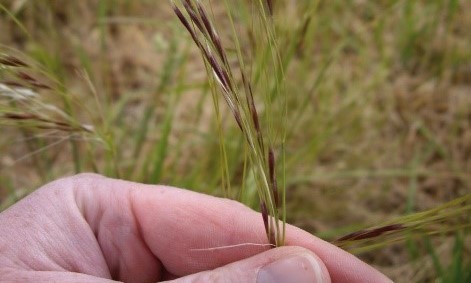
Current filter:

Soil, silt, and gravel can no longer be removed from the Tukituki and Waipawa Rivers to prevent the spread of the plant pest Chilean needle grass.
Hawke’s Bay Regional Council Team Leader Pest Plants Alice McNatty says Chilean needle grass has been found on the Tukituki River from where it meets with the Waipawa River to the river mouth, and on the Waipawa River below Stockade Road.
“No amount of gravel or silt can be removed from this area for any reason unless you have an exemption under the Biosecurity Act. Chilean needle grass is a harmful pest and we need cooperation from the public to make sure we prevent it from spreading”
“Chilean needle grass is a Pest Plant in the Hawke’s Bay Regional Council Pest Management Plan and can have a severe impact on farm production and animal welfare.”
“The seed is sharp, and spreads by attaching itself to anything that brushes past the plant. Animals, people, vehicles, machinery and equipment, soil, silt, gravel and contaminated feed can all move Chilean needle grass seed,” adds Ms McNatty.
Regional Council Schemes Team Leader Ant Rewcastle says consented gravel extraction has stopped for the time being where the area is infested.
“We acknowledge this has caused significant disruption to contractors, business plans, and specific projects at a busy time, and we appreciate the cooperation of all those effected as we work through solutions.
“We will be working with gravel extractors and biosecurity specialists to develop a protocol that will allow gravel extraction to resume under strict conditions. These could look like specific extraction processes, such as cleaning machinery, notifying and recording recipients, and limiting use to activities that minimise the spread, such as concrete or foundation material.” says Mr Rewcastle.
The Regional Council advises that care should be taken when visiting the Tukituki River during the seeding time of Chilean needle grass, between late October and February. Although the Regional Council and land owners undertake control of Chilean needle grass during this time, it’s important to check clothing, footwear, vehicles, dogs and horses to ensure no seed has attached that could be taken back to your property.
Please contact Alice McNatty on 06 835 9200 for advice and assistance with control or visit our pest hub.
22 January 2021
Disclaimers and Copyright
While every endeavour has been taken by the Hawke's Bay Regional Council to ensure that the information on this website is
accurate and up to date, Hawke's Bay Regional Council shall not be liable for any loss suffered through the use, directly or indirectly, of information on this website. Information contained has been assembled in good faith.
Some of the information available in this site is from the New Zealand Public domain and supplied by relevant
government agencies. Hawke's Bay Regional Council cannot accept any liability for its accuracy or content.
Portions of the information and material on this site, including data, pages, documents, online
graphics and images are protected by copyright, unless specifically notified to the contrary. Externally sourced
information or material is copyright to the respective provider.
© Hawke's Bay Regional Council - www.hbrc.govt.nz / +64 6 835 9200 / info@hbrc.govt.nz